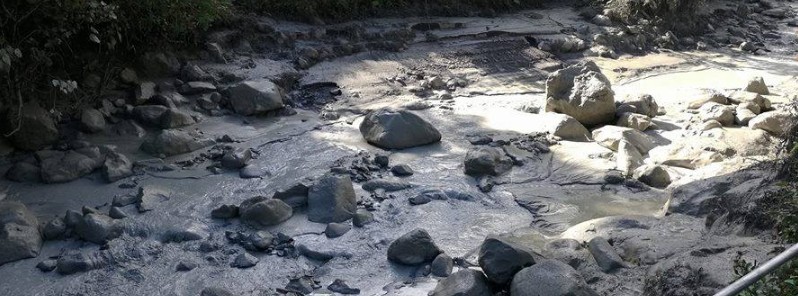Strong phreatic eruption at Poas volcano, lahars generated

A strong phreatic eruption took place at Costa Rica's Poas volcano between 00:00 and 01:00 UTC on April 13, 2017 (18:00 and 19:00 local time on April 12), the National University’s Volcanology and Seismology Research Institute (OVSICORI) reported. The institute added that the eruption generated lahars and advised all nearby communities to remain vigilant.
The institute cannot confirm the altitude of the eruption column due to the lack of visibility in the area. However, it is known that the eruption lasted for about 40 minutes and that ashfall was reported in nearby communities. A strong smell was also present.
Lahars were reported in Desague River, prompting officials to evacuate people living close to it.
New eruptions and lahars are possible in the next few hours or days, the institute warned and issued a Green alert for the following cantons: Poás, Sarchí, Alajuela, Zarcero, Grecia, San Carlos, and Río Cuarto.
The communities of San Carlos, adjacent to the Desague River, are asked not to visit rivers, waterfalls or puddles. All nearby communities are urged to remain vigilant and be attentive to the information released by official channels (OVSICORI, RSN).

Video courtesy David Gill TV / RadioTica (April 13, 2017)
Blas Sanches, a geologist at the RSN, visited Bajos del Toro to investigate lahars generated by the eruption and concluded they had no effects on bridges, roads or houses. However, it is not recommended for people to remain near river canals, he said.
Read more: Large group of tourists evacuated from Costa Rica's Poas volcano (April 9, 2017)
Update
April 14
According to RSN data, 5 eruptions took place at the volcano between 21:48 UTC on April 13 and 13:39 UTC on April 14.
Eruption of Poas volcano at 21:48 UTC on April 13 (15:48 CST)
Today's eruptions generated an impressive plume, seen and recorded by many people.
Geological summary
The broad, well-vegetated edifice of Poás, one of the most active volcanoes of Costa Rica, contains three craters along a N-S line. The frequently visited multi-hued summit crater lakes of the basaltic-to-dacitic volcano, which is one of Costa Rica's most prominent natural landmarks, are easily accessible by vehicle from the nearby capital city of San José. A N-S-trending fissure cutting the 2708-m-high complex stratovolcano extends to the lower northern flank, where it has produced the Congo stratovolcano and several lake-filled maars. The southernmost of the two summit crater lakes, Botos, is cold and clear and last erupted about 7500 years ago.
The more prominent geothermally heated northern lake, Laguna Caliente, is one of the world's most acidic natural lakes, with a pH of near zero. It has been the site of frequent phreatic and phreatomagmatic eruptions since the first historical eruption was reported in 1828. Eruptions often include geyser-like ejections of crater-lake water. (GVP)
Featured image: Lahar generated by a strong phreatic eruption of Poas volcano, Costa Rica – April 12, 2017. Credit: CNE

Commenting rules and guidelines
We value the thoughts and opinions of our readers and welcome healthy discussions on our website. In order to maintain a respectful and positive community, we ask that all commenters follow these rules:
We reserve the right to remove any comments that violate these rules. By commenting on our website, you agree to abide by these guidelines. Thank you for helping to create a positive and welcoming environment for all.